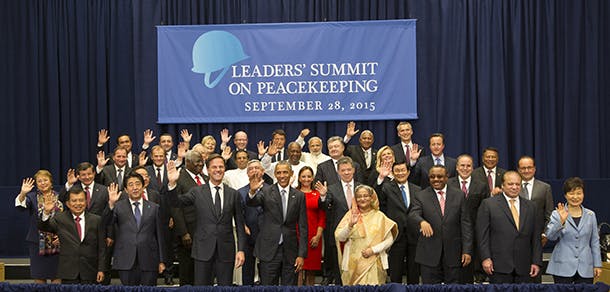
By Jordie Hannum, Executive Director of the Better World Campaign
Over the past few days, you may have heard about major summits taking place at this year’s UN General Assembly. I want to take a moment to discuss one from last year’s assembly. Namely, the historic Leaders’ Summit on Peacekeeping, convened by U.S. President Barack Obama and held at UN Headquarters.
At the summit, leaders of more than 50 countries gathered to pledge new commitments to strengthen UN Peacekeeping capabilities. The meeting was incredibly consequential as peacekeeping comprises the largest deployed military force in the world – 125,000 personnel in 16 operations spanning four continents – and peacekeepers are being asked to engage in more dangerous and volatile situations than ever before.
The commitments made at last September’s summit were critical to the efficacy of peacekeeping missions, but just a first step. As a result of the meeting, more than 40,000 troops and police, as well as helicopters, military engineering companies, and field hospitals were pledged to boost the capacity of peacekeeping missions. It is now just as important, however, to make sure the pledges materialize and that effective peacekeeping remains a priority for the international community.
As part of this process, last week, leaders from over 70 countries gathered in London for a UN Peacekeeping Defense Ministerial. Defense Secretary Ashton Carter spoke at the event – the first-ever dedicated speech on UN Peacekeeping by a U.S. Secretary of Defense – and highlighted the integral part UN Peacekeeping plays in international security. He said:
“We believe in the importance of UN Peacekeeping and the value of peace operations. We do so for humanitarian reasons, but also because, as defense officials, we appreciate that it is more efficient and effective to prevent the development of serious dangers, rather than confronting them later on.”
Secretary Carter went on to say: “It’s imperative that all our nations and militaries contribute more to these operations, and that we improve how we conduct them.”
The Secretary then provided a progress report on the Defense Department’s actions to make good on President Obama’s commitments from last year including, among other things, increasing the number of American military officers, training troop contributing countries to counter improvised explosive devices, and enhancing engineering and communications support.
Secretary Carter and other assembled defense leaders also pointed out the need for critical reforms. They rightly put the focus on three things: 1. selecting qualified leaders of peace missions and empowering them to more effectively manage their forces in complex and dangerous environments; 2. ensuring the leaders of peace operations and their forces are rigorously assessed against clear standards for their performance, equipment, and conduct and that underperforming units be sent home and replaced by someone more committed to the task; and 3. ensuring peacekeepers are better trained, equipped, enabled, and motivated to succeed.
All of these reforms will continue to be discussed next week during the UN General Assembly (and for that matter, in the halls of Congress, where Peter Yeo, Better World Campaign President and UN Foundation Vice President for Public Policy and Advocacy, will be testifying on peacekeeper effectiveness within the UN Mission in South Sudan next week).
As the United States elects a new President this fall and the UN selects a new Secretary-General, it’s more important than ever that we continue to engage and support peacekeeping missions and ensure they’re well equipped to succeed.
To get more involved, visit the Better World Campaign’s website to learn how you can relay your support for peacekeeping to your Member of Congress.
[Photo: UN Photo]



 View All Blog Posts
View All Blog Posts